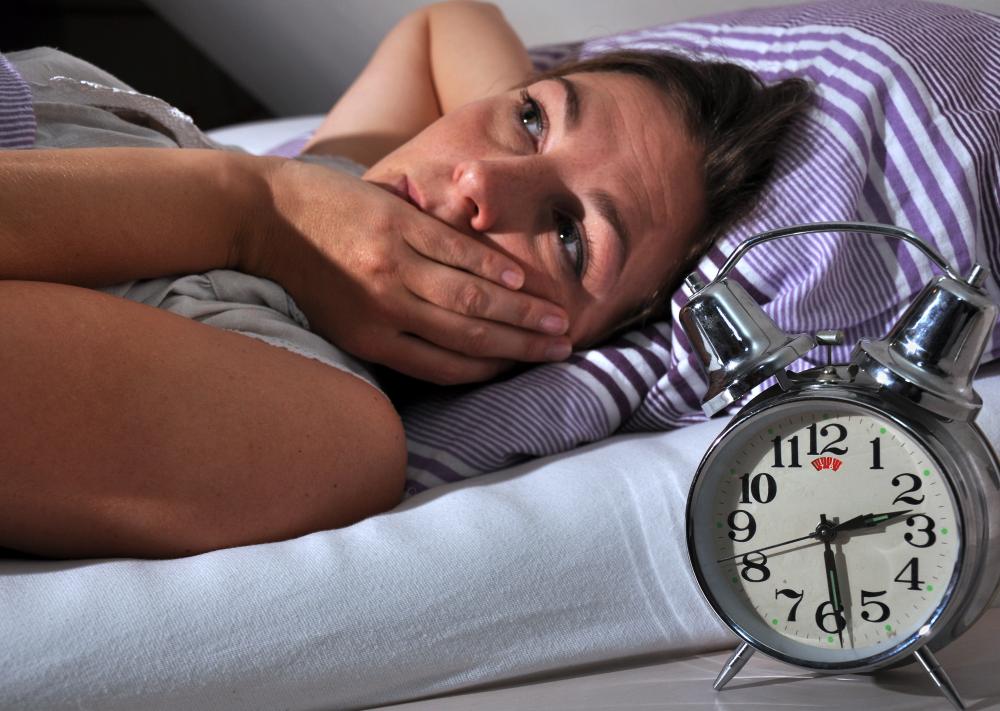At WiseGEEK, we're committed to delivering accurate, trustworthy information. Our expert-authored content is rigorously fact-checked and sourced from credible authorities. Discover how we uphold the highest standards in providing you with reliable knowledge.
What is Sleep Deprivation?
Sleep deprivation is a catch-all term for when the body doesn’t get sufficient sleep. It may be brought about by a number of causes, from physical illness, to psychiatric imbalance, to torture, and can have a wide range of consequences. At its most benign, this condition is something most of us deal with on a fairly regular basis, while at its most drastic it can be a life-threatening situation.
A loss of sleep is common simply as a result of circumstance among people who live busy and stressful lives. Students, particularly, often find themselves experiencing it on some level as they struggle to keep up with heavy workloads and busy social lives. Young children are also likely to get too little sleep, as they generally require more sleep than adults, and often do not get it.

Many people are unable to sleep because of anxiety or stress, as well, and any sleep they do get is fitful and frequently interrupted, leading to deprivation. Others may have physical pains or issues such as severe coughing that can cause them to be unable to fall asleep. In some cases, people may actively pursue insomnia for some of its psychological side effects, which can include hallucinations and surges of mania. Some religious mystics, most famously the Desert Fathers of the early Christian Church, are known to have induced sleep deprivation as a way of experiencing spiritual awakening.

Not sleeping enough can have many negative side effects, both physical and mental. Most immediately apparent is a slowing of mental awareness and responsiveness, a general dulling of thought processes. Physical responses are also dulled and slowed, and reflexes may be delayed or dampened. Memory loss and short lapses in memory can occur during sleep deprivation, as can spells of delirium and dizziness. Headaches, fainting spells, and nausea are physical effects that can be triggered by this condition, while a general moodiness and sometimes even psychotic behavior are psychological effects that can occur.

People who are experiencing sleep deprivation may also find it very difficult to stay awake, finding themselves constantly drowsy and nodding off. It can be difficult to keep one’s eyes open while tired, which, coupled with slowed reflexes, makes driving or other high-attention tasks quite dangerous. The body also functions more poorly on an autonomic level without enough sleep, and wounds can take longer to heal, and the body is more prone to sickness due to a weakened immune system.

Just how long people can go without sleep is a somewhat open question. There are people throughout the world who claim to have gone for many years, or even decades, without it. Some of these people even claim to experience none of the usual side effects. It is possible that some of these people are actually sleeping in extremely short bursts, called microsleep, which they do not remember, but which does rest their body a little. In the West, the longest officially documented period of sleep deprivation is just over eleven days, recorded in the Guinness Book of World Records in 1965. Because of the health risks associated with such extremes; however, the Guinness Book of World Records no longer recognizes the category, and since then no one has been documented at staying awake more than eleven consecutive days.
AS FEATURED ON:
AS FEATURED ON:
















Discussion Comments
@Pimiento - I definitely see where you're going with all of that information. There are definitely steps you can take to see if other sleep deprivation solutions will work before doing something drastic or having to go into a specialist for analysis. Thanks for the tips!
@baileybear - There are actually some helpful things you can do to avoid sleep deprivation or even just a lack of sleep period. You shouldn't eat anything with lots of caffeine in it (like chocolate) or drink drinks that are caffeine rich, either, obviously as they will prevent you from falling asleep quickly.
I gave up caffeinated drinks myself recently and have begun to sleep better at night as well as fall asleep much faster. Before it used to literally take hours. There are plenty of options out there for sleep deprivation help if you're willing to research it.
@babyksay - Sleep deprivation and insomnia can go hand in hand, but like you said it's not the only cause. I think stress more than anything can really affect a person to the point that they are not sleeping enough. Also, like you said before, being a new parent or having a life change like a divorce or death in the family.
Sleep deprivation can happen to anyone - new parents, insomniacs, people who are stressed out, and so on and so forth. There are many treatments for sleep deprivation. Good treatment will ease your REM sleep and allow you to have a more deep, restful sleep rather than too shallow of a snooze.
Post your comments